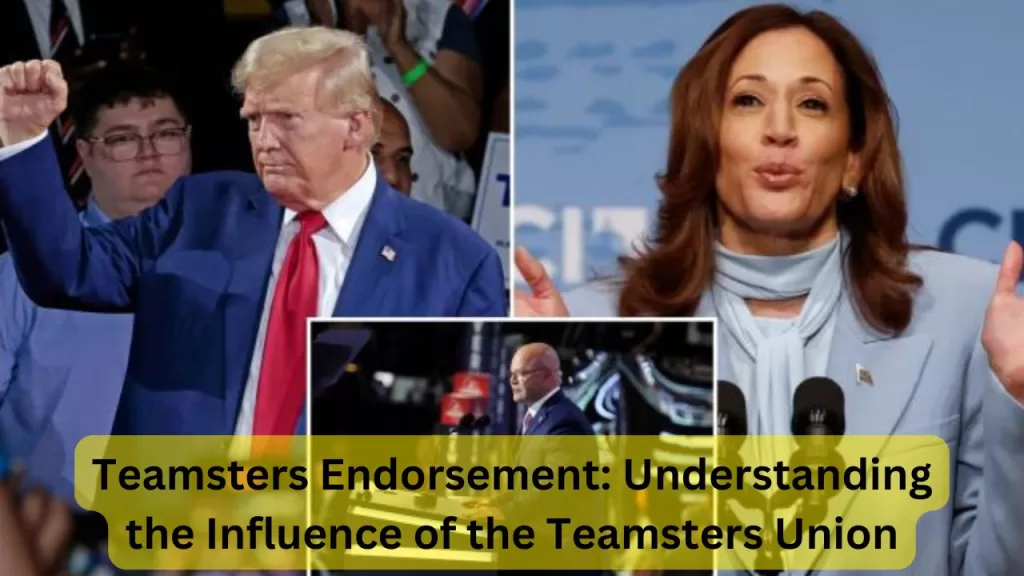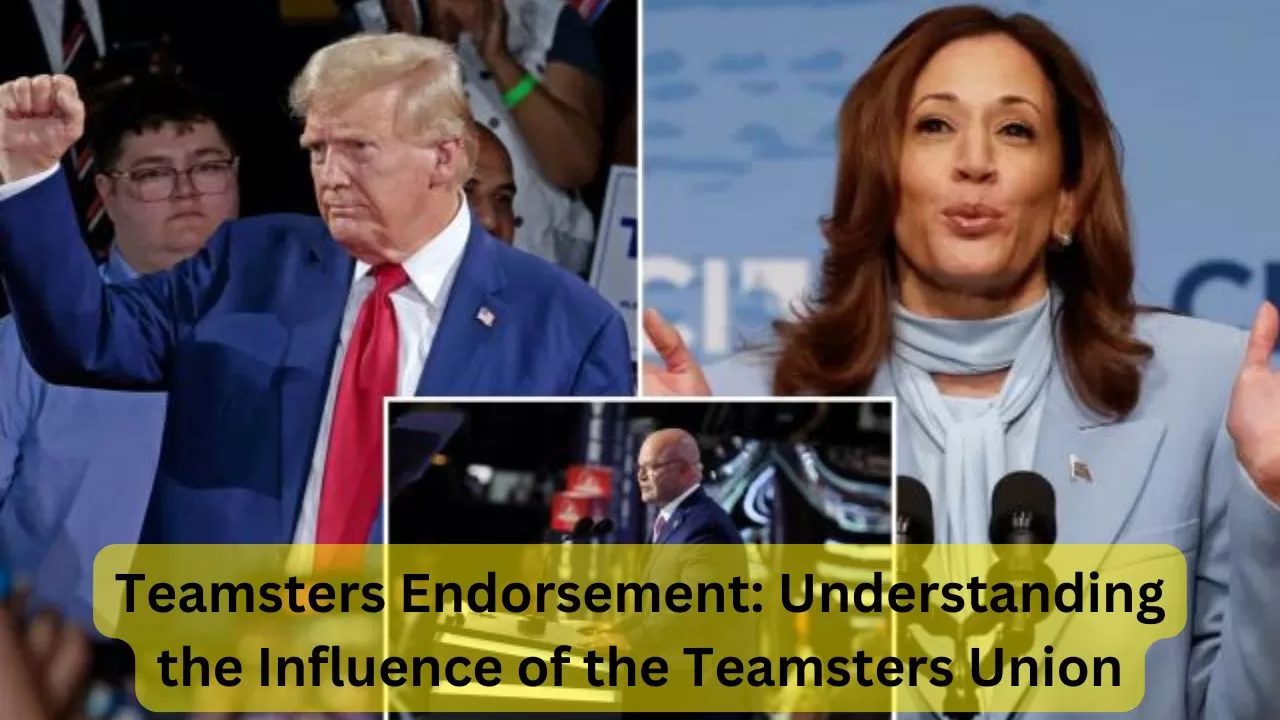
The Teamsters Union, one of the most influential labor organizations in the United States, has played a critical role in shaping labor policy and supporting political candidates for more than a century. From advocating for workers’ rights to endorsing presidential candidates, the Teamsters’ influence extends far beyond the workplace.
In this blog post, we’ll explore who the Teamsters are, what the Teamsters endorsement means, the role of the Teamsters Union in politics, and the impact of the Teamster’s presidential endorsement on elections.
Who Are the Teamsters?
The International Brotherhood of Teamsters (IBT), commonly known as the Teamsters Union, was founded in 1903. Originally, it represented drivers of horse-drawn wagons who transported goods across the country. Over time, the union evolved to represent workers in various industries, including transportation, warehousing, public services, healthcare, and entertainment.
Today, the Teamsters Union boasts over 1.4 million members, making it one of the largest labor unions in the world. The union’s mission is simple yet powerful: to advocate for better wages, benefits, working conditions, and job security for its members. They do this through collective bargaining, organizing, and political activism.
The Teamsters Union’s Political Influence
Beyond its work in advocating for labor rights in the workplace, the Teamsters have become a significant political force in the U.S. They have a history of engaging in political campaigns, supporting candidates who champion workers’ rights and policies that align with the union’s goals. Their involvement spans local, state, and national politics.
The Teamsters are known for their robust grassroots organizing, where they mobilize union members to participate in political campaigns by volunteering, canvassing, and even fundraising for candidates they endorse. The union also operates political action committees (PACs) that provide financial backing to candidates who support labor-friendly policies.
What Is a Teamsters Endorsement?
A Teamsters endorsement is a formal declaration of support by the union for a political candidate or policy initiative. This endorsement is highly sought after in political circles, as it not only signals strong union backing but also mobilizes the union’s vast membership to rally behind a candidate.
The endorsement process is thorough. The union carefully evaluates candidates to ensure they align with the values and priorities of the Teamsters. This includes reviewing their track record on labor issues, conducting interviews, and assessing their positions on key policies such as minimum wage laws, healthcare access, and workers’ rights.
Once a candidate is endorsed, the Teamsters Union uses its resources, including financial support and volunteer networks, to help ensure that candidate’s success in the election. This gives the endorsed candidate a significant advantage, especially in close races where every vote counts.
The Importance of the Teamsters Endorsement in Politics
A Teamsters endorsement carries significant weight in the political landscape, especially when it comes to labor issues. Here’s why:
1. Political Mobilization
The Teamsters are highly effective at mobilizing their members for political campaigns. With a union as large as the Teamsters, the ability to get out the vote and organize on-the-ground campaigning is unmatched. Members actively participate in canvassing, phone banking, and even serving as poll workers during elections.
This kind of grassroots support can make a critical difference, especially in tightly contested races, and candidates who receive a Teamsters endorsement know they have a reliable network of volunteers and voters behind them.
2. Financial Contributions
Through their political action committees (PACs), the Teamsters can contribute to candidates’ campaigns. This financial support not only helps cover the costs of running a campaign but also ensures that the endorsed candidates have the resources necessary to compete, especially against corporate-backed opponents.
The Teamsters’ financial backing often makes a candidate more competitive, particularly in races where labor rights are a key issue.
3. Influence on Policy Making
Candidates who receive a Teamsters endorsement are more likely to prioritize labor-friendly policies once they are in office. The union’s endorsement is built on the understanding that endorsed candidates will support policies that protect workers’ rights, improve wages, and ensure safe working conditions.
Once in office, these candidates often work closely with the union to draft and pass legislation that benefits the working class.
4. Trust and Credibility Among Voters
For many voters, especially those from working-class backgrounds or union households, a Teamsters endorsement is a trusted signal that a candidate will look out for their best interests. It serves as a recommendation from an organization that has long been a champion of workers’ rights.
The Teamsters Union’s long-standing history of fighting for labor rights gives their endorsement significant credibility, and candidates who earn this endorsement are often seen as strong advocates for the working class.
Teamsters Presidential Endorsement
One of the most influential political endorsements that the Teamsters can offer is their presidential endorsement. Every four years, during the U.S. presidential election cycle, labor unions like the Teamsters play a crucial role in shaping the outcome of the race.
The process of endorsing a presidential candidate is thorough and highly strategic. The union carefully evaluates each candidate’s stance on key labor issues such as:
- Job creation and minimum wage laws
- Healthcare reform
- Workers’ rights to organize
- Trade policies that affect American jobs
When the Teamsters endorse a presidential candidate, they commit to using their vast resources to help that candidate win the election. This includes engaging union members across the country to get involved in the campaign and turn out the vote.
Historical Presidential Endorsements
The Teamsters have a long history of endorsing candidates who support labor rights. Some of the most notable presidential endorsements include:
- Franklin D. Roosevelt: During the Great Depression, the Teamsters supported Roosevelt for his New Deal policies, which included significant labor reforms.
- John F. Kennedy: The Teamsters endorsed Kennedy in the 1960 election, recognizing his commitment to protecting workers’ rights.
- Barack Obama: In both 2008 and 2012, the Teamsters backed Obama for his strong support of labor unions, healthcare reform, and fair wages.
In recent years, the Teamsters endorsed Joe Biden in the 2020 presidential election, supporting his platform for strengthening labor laws, increasing the federal minimum wage, and expanding healthcare access.
The Role of the Teamsters Union Today
In today’s political climate, the Teamsters continue to be a powerful voice for workers. As labor laws and worker protections face new challenges, including the rise of the gig economy and efforts to weaken union rights, the Teamsters have remained steadfast in their advocacy for labor-friendly policies.
The union has also adapted to new industries, organizing workers in sectors like logistics, delivery services, and even parts of the tech industry. Their ability to evolve with the times has kept them relevant and influential in modern labor politics.
Conclusion
The Teamsters Union is much more than just a labor organization; it is a political powerhouse with the ability to influence elections, shape labor policy, and advocate for the rights of millions of workers across the United States. A Teamsters endorsement, especially a presidential endorsement, signals a commitment to labor-friendly policies and mobilizes a vast network of members to support endorsed candidates.
As the Teamsters Union continues to adapt to the challenges of the modern workforce, its role in politics remains as vital as ever, ensuring that workers’ voices are heard and their rights are protected.
Here are some keynotes from the article on Teamsters Endorsement:
- Teamsters Union (IBT): One of the largest and most powerful labor unions in the U.S., representing over 1.4 million members in various industries.
- Teamsters Endorsement: A formal declaration of support for political candidates or policies aligned with the union’s goals, such as labor rights, fair wages, and job security.
- Political Mobilization: The Teamsters can rally vast numbers of volunteers and voters, making a significant impact in local, state, and national elections.
- Presidential Endorsements: Historically, the Teamsters have endorsed key political figures like Franklin D. Roosevelt, John F. Kennedy, and Barack Obama, with an emphasis on supporting labor-friendly policies.
- Grassroots Campaigning: The union engages its members through canvassing, phone banking, and other forms of on-the-ground support during elections.
- Financial Backing: The Teamsters’ Political Action Committees (PACs) provide financial support to endorsed candidates, enhancing their competitiveness in campaigns.
- Evolving Influence: In modern times, the Teamsters have adapted to new industries and the challenges posed by the gig economy, continuing to be a major player in both the labor movement and political arena.
Improvements for the Article
- More Detailed Case Studies: Including real-world examples of recent Teamsters endorsements, like the 2020 Joe Biden campaign, could further illustrate their influence.
- Highlight More Current Challenges: Expanding on the rise of the gig economy and its impact on traditional labor organizing can show how the Teamsters are adapting to new labor challenges.
- Add Data or Stats: Incorporating specific statistics on how Teamsters endorsements have historically affected election results could offer a deeper analysis.
- Incorporate Union Members’ Voices: Adding quotes or testimonies from union members or leaders about the significance of the endorsement would humanize the article.
- Explain More on Policy Impact: Provide more in-depth examples of how endorsed candidates have influenced labor laws and policies while in office, showing concrete results of the Teamsters’ political activities.
These changes would deepen the reader’s understanding of the union’s political significance and provide a richer context on its evolving role.
